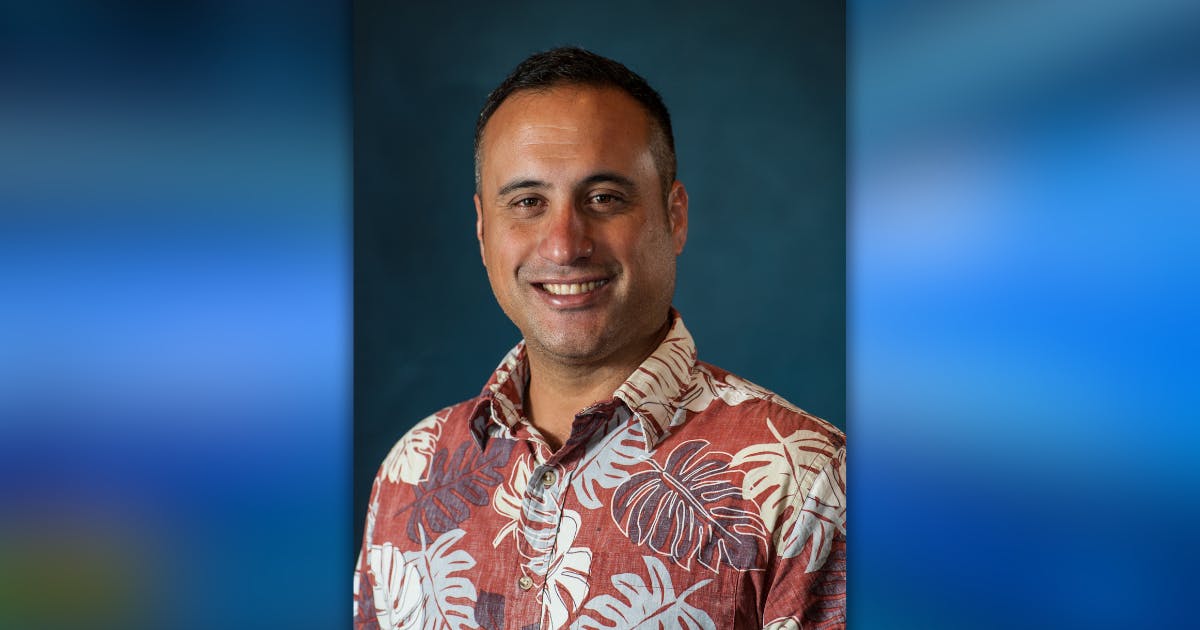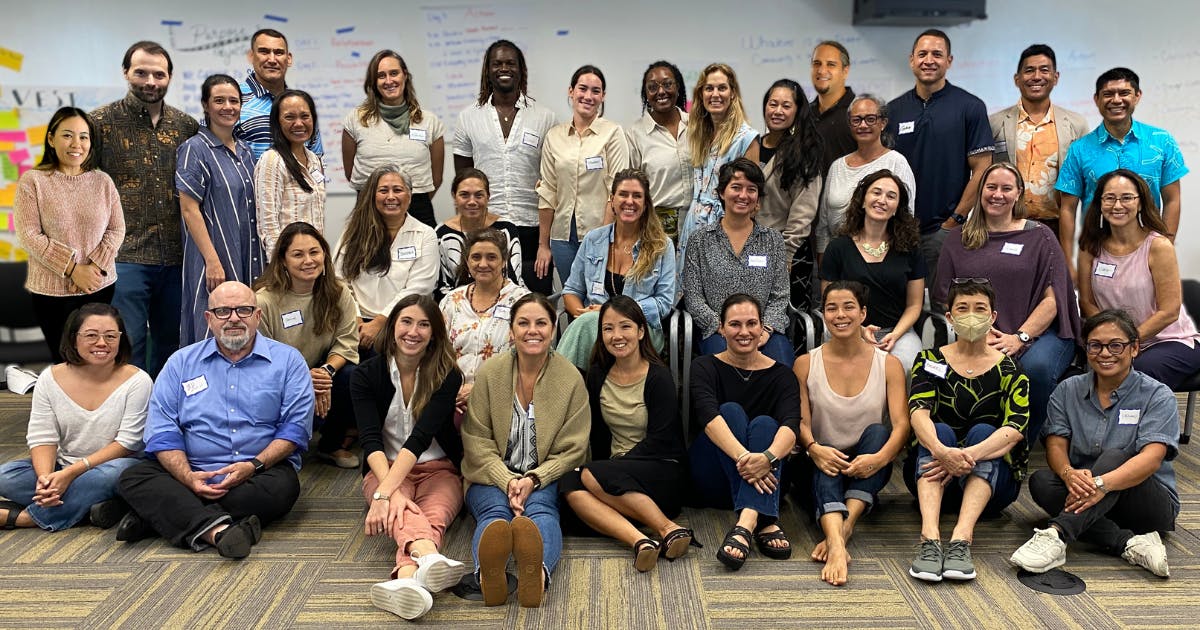
Photo of Kamuela Enos
Omidyar Fellow Kamuela Enos has a lot to say about indigeneity. After all, he’s the director for the Office of Indigenous Knowledge and Innovation (OIKI) in the University of Hawai‘i System.
“To me, it doesn’t mean Hawaiian and it doesn’t even mean brown people,” he says. “Indigeneity, what I learned from Dr. Manulani Aluli Meyer, means continuity. It’s a state of how humans existed pre-subscribing into a global economy, when we had hyper-localized systems.”
He says people’s genetics over multiple generations of human development have been tied to soil; to specific places and environments.
“Within a recent blip, we’ve traded that off to participate in a global supply chain economy. I’m not saying that was bad. I’m sitting in an air-conditioned car talking to you on a cell phone, so I need to be self-aware,” he laughs, referring to our conversation that took place over a video call.
OIKI, situated within the Office of the Vice President for Research and Innovation, serves as a catalyst for research development that is rooted in ancestral sciences and technologies, and innovation for societal impact that addresses the issues and problems of today.
“In Hawai‘i, [these sciences] were practiced in Ahupua‘a; they were optimized for living within the context of your watershed and were taught by family units and deployed in specific ecosystems,” he says. “There’s more than a thousand years of R&D on how they did it.”
“We can’t solve the challenges you see in a community and a degradation of ecosystems in silos. You have to restore these practices. Therefore, the communities that hold these practices… are your new ecosystem of innovation.”
Co-Creating Research with Community
The premise for OIKI was a gut microbiome study of MA‘O Farms interns beginning in 2017 by Dr. Alika Maunakea and Dr. Ruben Juarez which explored the impact of being a participant in the MA‘O internship on their health and physical well-being. The study was done in partnership with MA‘O Farms (where Kaumela had served as a director at the time of the study), the UH John A. Burns School of Medicine, and the UH Economic Research Organization.
Initial results showed that interns’ health improved over the course of their MA‘O internship, with 50-60% of interns being less likely to develop Type II diabetes within a year in the program. Through further examination of the interns’ social networks, the study revealed that people in households with a MA‘O intern were also 25% less likely to contract Type II diabetes.
As director of OIKI, Kamuela has been looking for ways to replicate research initiatives like the one at MA‘O that both involve the community and return the learning back to them.
“That’s the dynamic [of OIKI]: investing and creating this broader framework, investing in these research projects that pair practitioners in community with researchers to co-produce research that the community co-owns,” he says.
“We can’t solve the challenges you see in a community and a degradation of ecosystems in silos. You have to restore these practices. Therefore, the communities that hold these practices… are your new ecosystem of innovation.”
He points to organizations like MA‘O Farms, Purple Ma‘ia, and Paepae o He‘eia as key examples. “All of these powerful innovations are coming from the community,” he says. “The real opportunity for the University is to show up and be invited to partner with them, and then co-produce research.”
“The most important part of leadership is to move from positioning yourself as the dominant center to how you hold the space for people to enter and actualize who they’re supposed to be.”
This reciprocity benefits everyone: UH gains access to novel research and funding, while the partnering organization also uses the research to expand their efforts and improve the community it serves.
“[MA‘O Farms] used that research to fundraise. It positioned [MA‘O] as the intervention, so we used it to educate our students about their gut microbiome. It even became a catalyst for many of them to go into medical careers.”
Growth Through Healing
Since its creation in 2019, OIKI has been a part of a number of community-based programs and research projects at UH, including ones involving climate-smart food production, health equity for NHPI communities, improving AI through Indigenous knowledge, and supporting climate resilience through data science. The Office also has plans to establish and launch an Indigenous Data Hub at the University. At the core of all these initiatives are the community and its people.
“Projects are projects,” Kamuela says, “and projects don’t actually see and understand people’s growth and create the space for them to step into leadership.”
“The most important part of leadership is to move from positioning yourself as the dominant center to how you hold the space for people to enter and actualize who they’re supposed to be,” he adds.
He explains that the leadership principles of OIKI are clarity, efficacy, dignity, and healing.
“It starts with me as a director,” he says. “I have to be clear to others, then that creates a space for efficacy. If people know what their job is, they know what their role is. And when you have efficacy, then you have dignity. There’s a structure provided for them to be in alignment. Then when people are dignified over time, they heal.”
He believes this individual healing ultimately leads to healing systems.
“Healing, to me, is the actual word we should use instead of growth,” he says. “[OIKI] has been expanding our portfolio every year, but it’s not the kind of toxic expansion that’s stayed tied to the need to be affirmed all the time. It’s growing at the pace of people’s capacity to sustain it.”
He says he and his core team takes this approach with everyone they interact with—from other departments within UH to others in the community.
“The communities want to work with us because we’re really clear with them: these are the parameters; these are the dangers of this work,” he adds. “We’re asking them to be a pilot with us. It may not work, but I’ve found that in my fourth year, it’s held everything together.”
Learn more about the Office of Indigenous Knowledge and Innovation at https://research.hawaii.edu/oiki.
Omidyar Fellow Aki Marceau shares reflections from a recent 3-day session on participatory leadership and facilitation.
